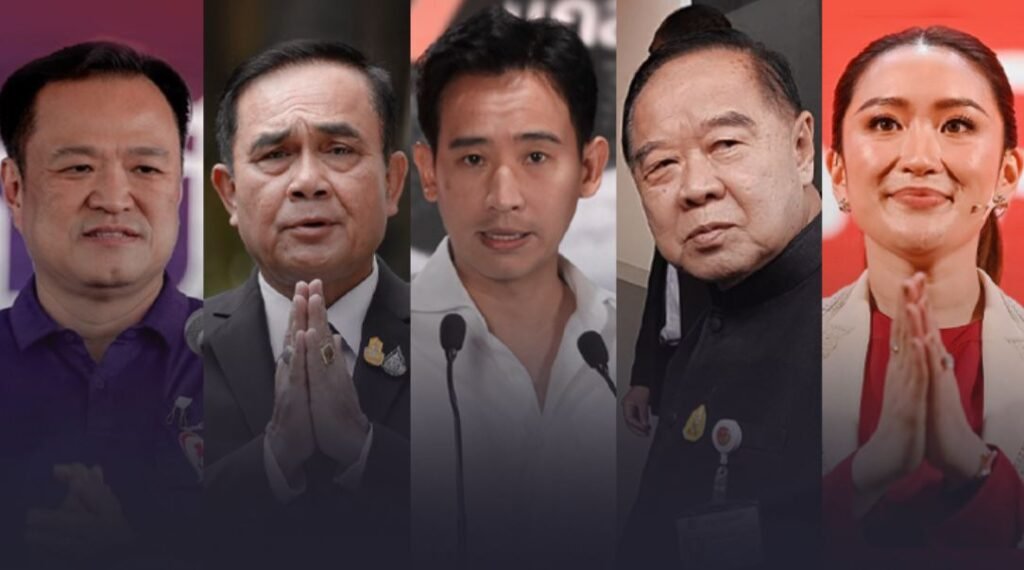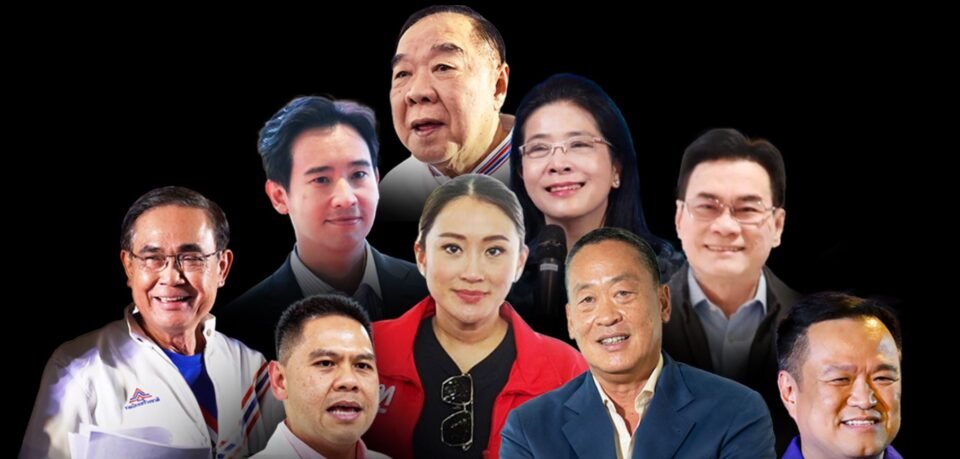The number of constituency seats in Bangkok has increased from 30 at the 2019 general election to 33 at the national election this year as a result of boundary redistricting. Nakhon Ratchasima, which is ranked second with 16 seats, has more than twice as many constituency seats as the capital.
Bangkok voters in this election will undoubtedly have a greater say in which party forms the next administration if party-list votes are also taken into account.

Parties have begun courting Bangkok voters in preparation for the election, which is tentatively set for May 7.
Dr. Olarn Thinbangtieo, a professor at Burapha University’s Department of Political Science and Law, predicted that the competition will be fierce.
According to Olarn, no political party has a monopoly on the voter base in Bangkok, hence every political party has a possibility of succeeding there.

The Palang Pracharath Party prevailed in the 2019 election for Bangkok constituencies, winning 12 of the capital’s 30 MP seats. With nine seats each, Pheu Thai and Go Forward tied for second place.
Nonetheless, Move Forward received 804,772 of the total votes cast in Bangkok, followed by Palang Pracharath (791,893) and Pheu Thai (604,699).
Despite receiving 474,820 votes in Bangkok, the Democrat Party was unable to win any of the MP elections.
The leader of the Democrats, Jurin Laksanawisit, is certain that the party’s prospects will improve in this election.
“Although though we did not receive any seats in the constituency election for Bangkok in 2019, we are confident that Bangkokians will support us this time. Our standing in the capital is improving once more,” he declared.
Prof. Dr. Suchatvee Suwansawat and former Palang Pracharath MP Watanya “Madame Dear” Bunnag have already begun introducing themselves as the Democrats’ MP candidates for the city, hoping to win over Bangkok voters.
Suchatvee ran as a Democrat for Bangkok governor last year, but she was defeated by independent candidate Chadchart Sittipunt.
Pita Limjaroenrat, the head of Move Forward, is optimistic that his party would perform even better this time around and has stated that he anticipates his party to win at least half of the Bangkok MP seats available for grabs.
He has good grounds to feel assured. In addition to receiving the most votes in Bangkok at the most recent general election, his party also earned the most taxpayer donations in the fiscal year 2021. Also, it received a lot of support from city residents during the Bangkok council election.
For the majority of the capital’s electoral districts, Move Forward has already named candidates.
Meanwhile, Pheu Thai, the leader of the opposition, is the only party that has announced candidates for all 33 Bangkok constituencies. In the capital, it aims to win 17 to 18 seats.
Puangpet Chunlaiad, the head of the Pheu Thai coordination committee for political affairs in Bangkok, declared that all of his party’s candidates were highly competent and involved in their respective seats. “Our policies are also carefully crafted to deal with regional issues.”
Yet, Palang Pracharath runs the risk of losing Bangkok voters’ backing and falling far short of its winning position from four years ago.
Olarn stated that the party’s popularity was declining and that “a number of its Bangkok MPs had defected to join other parties.”
Only one Bangkok MP has remained loyal to the group. General Prayut Chan-o-cha, the former vote-getter for Palang Pracharath and the current prime minister since orchestrating the coup in 2014, has also switched parties and said he will run for prime minister once more under the Ruam Thai Sang Chart banner.
Sakoltee Phattiyakul, a former MP and deputy governor of Bangkok, has been hired by Palang Pracharath to serve as its top strategist for its campaign in Bangkok, although expectations are not great.
“We acknowledge that Palang Pracharath’s support from Bangkok voters in 2019 had a significant impact on Prayut. But, we are confident that Bangkok voters would select our policies this time,” Sakoltee stated.
The Bhumjaithai Party, which has traditionally been associated with rural areas, is broadening its electoral scope this year to include voters in Bangkok. In order to get ready, it has attracted five former Bangkok MPs from Palang Pracharath and hired Buddhipongse Punnakanta, a former co-leader of the once-popular People’s Democratic Reform Committee.
Anutin Charnvirakul, the head of the Bhumjaithai, declared, “We are prepared and we want to win.
Prior to this national election, Buddhipongse said that Bhumjaithai had given its policies for Bangkok significant consideration. The party is almost finished with its list of candidates for the Bangkok Municipality.
Eight former Bangkok MPs are all present, according to Buddhipongse. This force predicts that Bhumjaithai will soon elect its first members of the Bangkok legislature.
The Chartthaipattana Party, under the leadership of Varawut Silpa-archa, has committed to run at least ten candidates in Bangkok.
The Chart Pattana Kla Party of Korn Chatikavanij and the Thai Sang Thai Party of Sudarat Keyuraphan are both stepping up their efforts in the city.
Prayut’s party, Ruam Thai Sang Chart, has yet to reveal its candidates for the capital’s MP elections.
Who has a better chance of winning in Bangkok?
According to Olarn, the outcomes of the 2022 election for the governor and councilors of Bangkok demonstrated that Bangkok voters’ support is expanding to include many more political parties and groupings.
Several of the elected Bangkok council members were associated with Pheu Thai, therefore its MP candidates ought to have an advantage in the city, according to him.
He stressed that Pheu Thai should proceed cautiously to prevent errors.
According to the techniques it employs, its tight ties to exiled former prime minister Thaksin Shinawatra may be a strength in the provinces but a problem in the capital.
Olarn noticed that Pheu Thai interacts effectively with the urban poor, whereas Move Forward appeals to the younger generation and first-time voters.
Meanwhile, Bhumjaithai is concentrating on appealing to middle-class and working-class voters because it is fully aware that it won’t be a favorite among youthful voters.
The Democrat Party is confident in its ability to maintain its current voting base, but it will need to do more to increase its popularity given that many of its top politicians have already left for other parties.
But, political mood prior to the general election will also be taken into account in Bangkok. This might very well be the deciding element, according to Olarn.




